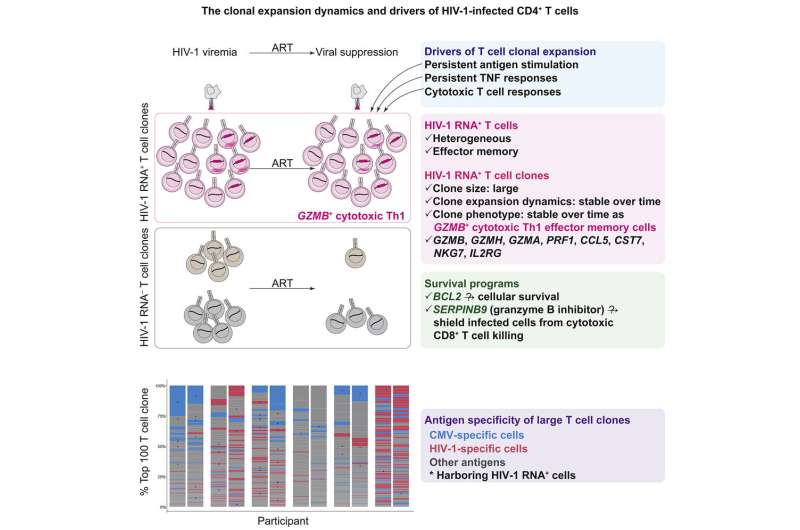Home » Health News »
HIV hides within immune system’s ‘police stations’

Antiretroviral therapy (ART) is highly effective at controlling HIV infections, but the virus never completely goes away. Instead, it hides in roughly one in every 1 million immune cells.
Specifically, HIV hides within specialized cells known as cytotoxic CD4+ T cells, which are the immune system’s best fighters, a new study by Yale School of Medicine researchers found. These HIV-infected immune cells are able to shield themselves from being killed by other immune system cells.
Since CD4+ T cells also help kill cancer cells and control infections, identifying the virus-harboring cells is a crucial step towards eradicating the virus that causes AIDS, researchers say.
The new study was published March 22 in the journal Immunity.
For the study, a team led by first author Jack Collora, a microbiology graduate student at Yale, used a cutting-edge technology called single-cell multi-omic sequencing to study HIV-infected cells of people living with HIV. Collora is a member of the lab of Ya-Chi Ho, associate professor of microbial pathogenesis and medicine.
The specialized cytotoxic CD4+ T cells where HIV cells hide also produce cancer-fighting proteins called Granzyme B, as well as a protein called Serpin B9 that acts as a shield that protects then from being damaged by toxic proteins. However, when HIV hides behind these well-shielded fighters, the immune system cannot eliminate HIV-infected cells.
“These cells are like police stations protecting our body against cancer and infection,” said Ho, the senior author of the study. “The problem is, how do we kill HIV without damaging these key immune system fighters? The goal is not to remove police stations, but to find out why there are expanding numbers of police stations where HIV can hide.”
Researchers had previously understood that HIV-infected individuals have higher levels of inflammation, a condition known as chronic antigen stimulation, which increases the number of potentially HIV-hiding T cells.
“One immediate solution to rooting out hidden HIV is to control chronic antigen stimulation in people living with HIV,” Ho said. “When these pathogen dangers are gone, the body would naturally downsize the number of police stations and shrink the number of hiding places for HIV.”
Source: Read Full Article



